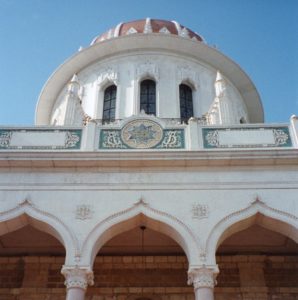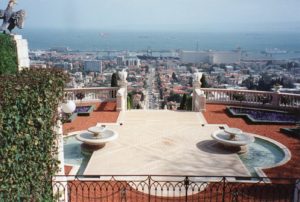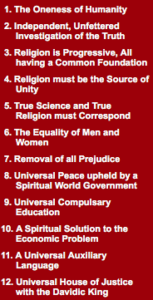This treatise was written in reply to a seeker who had asked how the promised Mihdí could have become transformed into ‘Alí-Muḥammad (the Báb). The opportunity provided by this question was seized to elaborate on a number of subjects, all of which are of use and benefit both to them that seek and to those who have attained, could ye perceive with the eye of divine virtue.
Baha’u’llah, Preface to Gems of Divine Mysteries
*****
I heard, with Mine own ears, one of their divines proclaim: “Should all these signs come to pass and the long-awaited Qá’im appear, and should He ordain, with respect to even our secondary laws, aught beyond that which hath been revealed in the Qur’án, we would assuredly charge Him with imposture, put Him to death, and refuse forever to acknowledge Him”, and other statements such as these deniers make. And all this, when the Day of Resurrection hath been ushered in, and the Trumpet hath been sounded, and all the denizens of earth and heaven have been gathered together, and the Balance hath been appointed, and the Bridge hath been laid, and the Verses have been sent down, and the Sun hath shone forth, and the stars have been blotted out, and the souls have been raised to life, and the breath of the Spirit hath blown, and the angels have been arrayed in ranks, and Paradise hath been brought nigh, and Hell made to blaze! These things have all come to pass, and yet to this day not a single one of these people hath recognized them! They all lie as dead within their own shrouds, save those who have believed and repaired unto God, who rejoice in this day in His celestial paradise, and who tread the path of His good-pleasure.
Veiled as they remain within their own selves, the generality of the people have failed to perceive the sweet accents of holiness, inhale the fragrance of mercy, or seek guidance, as bidden by God, from those who are the custodians of the Scriptures. He proclaimeth, and His word, verily, is the truth: “Ask ye, therefore, of them that have the custody of the Scriptures, if ye know it not.” Nay rather, they have turned aside from them and followed instead the Sámirí of their own idle fancies. Thus have they strayed far from the mercy of their Lord and failed to attain unto His Beauty in the day of His presence. For no sooner had He come unto them with a sign and a testimony from God than the same people who had eagerly awaited the day of His Revelation, who had called upon Him in the daytime and in the night season, who had implored Him to gather them together in His presence and to grant that they may lay down their lives in His path, be led aright by His guidance and illumined by His light—this very people condemned and reviled Him, and inflicted upon Him such cruelties as transcend both My capacity to tell and thine ability to hear them. My very pen crieth out at this moment and the ink weepeth sore and groaneth. By God! Wert thou to hearken with thine inner ear, thou wouldst in truth hear the lamentations of the denizens of heaven; and wert thou to remove the veil from before thine eyes, thou wouldst behold the Maids of Heaven overcome and the holy souls overwhelmed, beating upon their faces and fallen upon the dust.
Alas, alas, for that which befell Him Who was the Manifestation of the Self of God, and for that which He and His loved ones were made to suffer! The people inflicted upon them what no soul hath ever inflicted upon another, and what no infidel hath wrought against a believer or suffered at his hand. Alas, alas! That immortal Being sat upon the darksome dust, the Holy Spirit lamented in the retreats of glory, the pillars of the Throne crumbled in the exalted dominion, the joy of the world was changed into sorrow in the crimson land, and the voice of the Nightingale was silenced in the golden realm. Woe betide them for what their hands have wrought and for what they have committed!
*****
But as to Him Who appeared in the year sixty, He standeth in need of neither transformation nor interpretation, for His name was Muḥammad, and He was a descendent of the Imáms of the Faith. Thus it can be truly said of Him that He was the son of Ḥasan, as is undoubtedly clear and evident unto thine eminence. Nay, He it is Who fashioned that name and created it for Himself, were ye to observe with the eye of God.
Baha’u’llah, Gems of Divine Mysteries (excerpts)
*****
Now the Siyyid Báb had disposed all His affairs before setting out from Chihríq towards Tabríz, had placed His writings and even His ring and pen-case in a specially prepared box, put the key of the box in an envelope, and sent it by means of Mullá Báqir, who was one of His first associates, to Mullá ‘Abdu’l-Karím of Qazvín. This trust Mullá Báqir delivered over to Mullá ‘Abdu’l-Karím at Qum in presence of a numerous company. At the solicitations of those present he opened the lid of the box and said, “I am commanded to convey this trust to Bahá’u’lláh: more than this ask not of me, for I cannot tell you.” Importuned by the company, he produced a long epistle in blue, penned in the most graceful manner with the utmost delicacy and firmness in a beautiful minute shikastih hand, written in the shape of a man so closely that it would have been imagined that it was a single wash of ink on the paper. When they had read this epistle [they perceived that] He had produced three hundred and sixty derivatives from the word Bahá. Then Mullá ‘Abdu’l-Karím conveyed the trust to its destination.
Well, we must return to our original narrative. The Prime Minister issued a second order to his brother Mírzá Ḥasan Khán, the gist of which order was this: “Obtain a formal and explicit sentence from the learned doctors of Tabríz who are the firm support of the Church of Ja’far (upon him be peace) and the impregnable stronghold of the Shí‘ite faith; summon the Christian regiment of Urúmíyyih; suspend the Báb before all the people; and give orders for the regiment to fire a volley.”
Mírzá Ḥasan Khán summoned his chief of the farráshes, and gave him his instructions. They removed the Báb’s turban and sash which were the signs of His Siyyid-hood, brought Him with four of His followers to the barrack square of Tabríz, confined Him in a cell, and appointed forty of the Christian soldiers of Tabríz to guard Him.
Next day the chief of the farráshes delivered over the Báb and a young man named Áqá Muḥammad-‘Alí who was of a noble family of Tabríz to Sám Khán, colonel of the Christian regiment of Urúmíyyih, at the sentences of the learned divine Mullá Muḥammad of Mamaqán, of the second ecclesiastical authority Mullá Mírzá Báqir, and of the third ecclesiastical authority Mullá Murtadá-Qulí and others. An iron nail was hammered into the middle of the staircase of the very cell wherein they were imprisoned, and two ropes were hung down. By one rope the Báb was suspended and by the other rope Áqá Muḥammad-‘Alí, both being firmly bound in such wise that the head of that young man was on the Báb’s breast. The surrounding housetops billowed with teeming crowds. A regiment of soldiers ranged itself in three files. The first file fired; then the second file, and then the third file discharged volleys. From the fire of these volleys a mighty smoke was produced. When the smoke cleared away they saw that young man standing and the Báb seated by the side of His amanuensis Áqá Siyyid Ḥusayn in the very cell from the staircase of which they had suspended them. To neither one of them had the slightest injury resulted.
Sám Khán the Christian asked to be excused; the turn of service came to another regiment, and the chief of the farráshes withheld his hand. Áqá Ján Big of Khamsíh, colonel of the bodyguard, advanced; and they again bound the Báb together with that young man to the same nail. The Báb uttered certain words which those few who knew Persian understood, while the rest heard but the sound of His voice.
The colonel of the regiment appeared in person: and it was before noon on the twenty-eighth day of Sha’bán in the year [A.H.] one thousand two hundred and sixty-six. Suddenly he gave orders to fire. At this volley the bullets produced such an effect that the breasts [of the victims] were riddled, and their limbs were completely dissected, except their faces, which were but little marred.
Then they removed those two bodies from the square to the edge of the moat outside the city, and that night they remained by the edge of the moat. Next day the Russian consul came with an artist and took a picture of those two bodies in the posture wherein they had fallen at the edge of the moat.
On the second night at midnight the Bábís carried away the two bodies.
On the third day the people did not find the bodies, and some supposed that the wild beasts had devoured them, so that the doctors proclaimed from the summits of their pulpits saying, “The holy body of the immaculate Imám and that of the true Shí‘ite are preserved from the encroachments of beasts of prey and creeping things and wounds, but the body of this person have the wild beasts torn in pieces.” But after the fullest investigation and inquiry it hath been proved that when the Báb had dispersed all His writings and personal properties and it had become clear and evident from various signs that these events would shortly take place, therefore, on the second day of these events, Sulaymán Khán the son of Yaḥyá Khán, one of the nobles of Ádhirbáyján devoted to the Báb, arrived, and proceeded straightway to the house of the mayor of Tabríz. And since the mayor was an old friend, associate, and confidant of his; since, moreover, he was of the mystic temperament and did not entertain aversion or dislike for any sect, Sulaymán Khán divulged this secret to him saying, “Tonight I, with several others, will endeavor by every means and artifice to rescue the body. Even though it be not possible, come what may we will make an attack, and either attain our object or pour out our lives freely in this way.” “Such troubles,” answered the mayor, “are in no wise necessary.” He then sent one of his private servants named Ḥájí Alláh-Yár, who, by whatever means and proceedings it was, obtained the body without trouble or difficulty and handed it over to Ḥájí Sulaymán Khán. And when it was morning the sentinels, to excuse themselves, said that the wild beasts had devoured it. That night they sheltered the body in the workshop of a Bábí of Milán: next day they manufactured a box, placed it in the box, and left it as a trust. Afterwards, in accordance with instructions which arrived from Ṭihrán, they sent it away from Ádhirbáyján. And this transaction remained absolutely secret.
*****
Abdu’l-Baha’
Exc. from: A Traveler’s Narrative-Written to Illustrate the Episode of the Bab
The Shrine of the Bab, wherein His body was interred.
The view from the Shrine of the Bab.
The Principles Of The Faith For Which The Bab Sacrificed His Life


